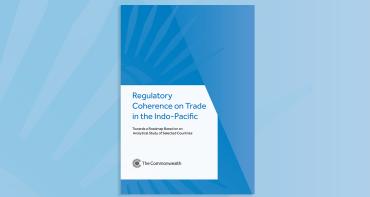Speaker: Commonwealth Secretary-General Kamalesh Sharma
Lord Mayor, Excellencies, High Commissioners, Co-Chairpersons of the Colloquium, lords, ladies and gentlemen; I am honoured to be invited to speak tonight as we mark the fortieth anniversary of the UK-Canada Colloquia. The UK and Canada are both pillars of the Commonwealth and engaged and sympathetic partners of the Secretariat. I value them immensely for this, as for their supportive encouragement personally to me.
It seems not so long ago that we would have understood fragility in a very different way. There were potentially fragile areas of the world and others characterised by solidity and stability. Now the ground seems to have moved under the feet of all of us. The superstructures of giant economies seem to have been resting on a tectonic plate. Fragility and uncertainty now lurk in corridors that have never known them before. We seem to be poised on the brink of a world of both promise and peril.
Gripped by metamorphosis, we are conscious of dying to the older world, but know not what brave new world awaits us. But we do sense that our collective destiny is at a fateful pass. The president of a famous American university observed recently that the transformation surrounding us will be more profound in its consequences than either the Reformation or the Industrial Revolution. Caught up in it at close quarters we cannot measure its significance. But one prospect appears certain, the twenty first century will be the make or break century for humanity. The century is unique inasmuch as none of its dilemmas are amenable to being postponed to the following century. This overcrowded and environmentally degrading planet will either make it in the years to come, or not. It is for us to write the next chapter – and to make sure that it is not the last.
In seeking to control the narrative henceforth the following will be determining.
· The rise of supplementary massive economies is a challenge to existing economic order and complicates global efforts at consensus in reaching a balance of obligations, currently most prominently in areas of climate change or a developmental trade round. But new wealth ushers in a prospect of bringing a tide in global revival and escape from the curse of poverty and unrestrained growth in our numbers.
· The rise of other societies is an augmentation of human resource, in the global pool of skills, abilities and inventiveness – the promise of being able to stay ahead of the curve of the challenge.
· The prospect of harnessing and harvesting technology in the service of the human community brightens the prospect ahead.
If we exercise the infinite resource of human wisdom, we can shape the world closer to our hearts’ desire. The great global good that the modern Commonwealth has been since it arose has been a force for collective sanity and aspiration. And as the Commonwealth is the whole world within itself, what the Commonwealth thinks today the world can think tomorrow.
The Commonwealth knows that no nation is an island unto itself, but all are joined to the main. Every human community has the right to national salvation and a place in the sun, irrespective of size, population or endowment. The Commonwealth recognises that advancement must embrace all. The world now sees the danger of the virus of the globalising uncivil society attaching itself to those being left behind.
The Commonwealth believes that what constitutes a successful society is one that grounds itself in respect for individual freedoms, nourishes the culture of democracy, promotes the rule of law and secures the human rights of its people: in other words, one grounded in values. Members of the Commonwealth have carried this commitment to ethical leadership to ther own regions and have thus helped advance a global norm constantly gaining ground. It is not an accident that in the widely recognised Mo Ibrahim Index of laudable governance in Africa, seven in the first ten - indeed the first eight - ranked highest are countries from the Commonwealth, and none in the last ten. This is because of the constant sedimentation of values we work by. Recently our Heads of Government at Perth took a giant step forward in securing these values further, continuing to show the way.
We know that only the young – who now constitute the bulk of our societies, which are getting ever younger – can shape a secure future and give it substance. But how do we equip them, with tools and self-belief, that they may do so? We build very ambitiously on the oldest youth programme which any organisation has.
We know that our women are the redemption of our societies – the true barometer of a society’s health. Fragility can never be overcome if our women remain vulnerable and their potential fettered. We work particularly on women as economic agents of change in their societies and in mainstreaming their concerns in shaping national policy.
The word ‘sustainability’ is often heard in conjunction with fragility. In the Commonwealth we also emphasise ‘resilience’. It is crucial for us to stay the distance. That is why, in setting our vision high when aiming to help small states and vulnerable states, we seek to work alongside them in very practical ways such as by boosting their trade and addressing their priority concerns. Our efforts include building capacity and helping to ensure their voice is heard in multilateral negotiations and in global discourse. We do this now very energetically through the vehicle of the Group of Twenty, with the support of the UK and Canada. Prime Minister Harper showed us the way.
We have opened Commonwealth Small States Offices in New York and now in Geneva to help them and their organisations in every way in the fast-paced and demanding multilateral world.
One of the first states to take up tenancy in the Geneva office was Sierra Leone. It is a good example of how we can support fragile states. The armed forces of both the UK and Canada played a part in stabilising the situation there. The UK subsequently channelled much of its support for rebuilding the institutions and infrastructure of the country through our Commonwealth fund for technical cooperation. This enabled us to arrange for the Sierra Leone police to receive training from Botswana. It funded support from Malaysia in rebuilding Sierra Leone’s cocoa industry.
I had meetings in Geneva yesterday, at their four year conference, on work the Commonwealth is doing with the International Committee of the Red Cross. We collaborate on building capacity on humanitarian law: dealing with everything from narcotics and child trafficking, to cluster munitions use, to dealing with uncivil society that tends to emerge quickly at times of crisis and uncertainty.
The common theme we found was that both of our organisations work to address fragility – and whilst the ICRC focus includes short term humanitarian needs, both the ICRC and the Commonwealth also focus on building longer term capacity. It was also striking that neither of us seeks to make as much of our contribution publicly as we might. It is our discretion that creates a climate of trust in which our work is best advanced. Our focus is more on the impact than on claiming credit.
Vulnerability can sharpen awareness, innovation, creativity and the wherewithal to build resilience. Effectively addressing the root causes of fragility effectively requires a long-term and sustained commitment. We labour long in the vineyard, and we don’t seek to have our effort recognised on the wine bottle label.
Much of our work – whether in institution-building, creating capacities, monitoring and strengthening democratic elections, enlightened public policy and governance, technical cooperation, in a word advancing the features of resilience – would not be possible without the true and helping hand of the countries celebrating their colloquia today. Their constant partnership with their fellow member states shores the national efforts of these smaller and vulnerable states towards a secure future. We applaud their steady support and spirit of solidarity.
I am prone only mildly to bouts of sentimentalism, but I admit that as a speaker from India tonight and when I see the company present, I am beset by nostalgia. When the modern Commonwealth was created in 1949, the three drivers of the London Declaration were generally credited as Clement Attlee, Jawaharlal Nehru and Lester Pearson. They took a giant leap of faith, and made history. I would like to think that watching us now they smile at their sagacity and foresight.
Distinguished guests, fragility, like love, is in the eye of the beholder. It is our choice, whether we wish to see strength instead. Let us choose strength: let us attain it. There is no doctrine which forces us to choose doubt: we can embrace self-belief instead. Let us realise it.



